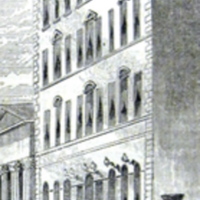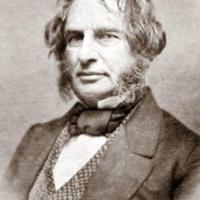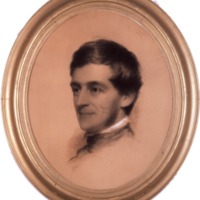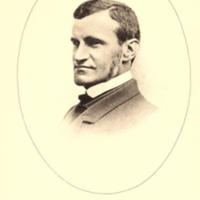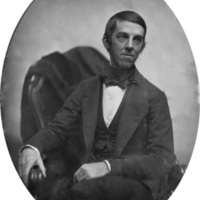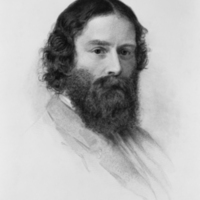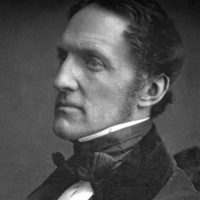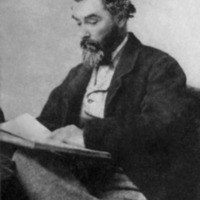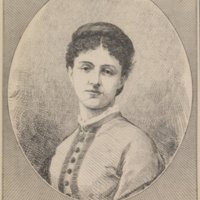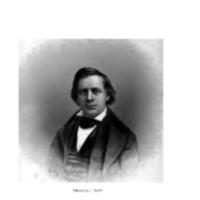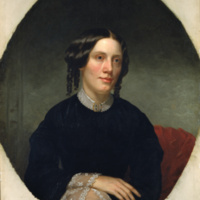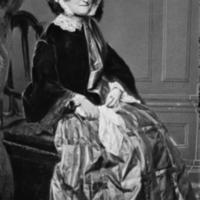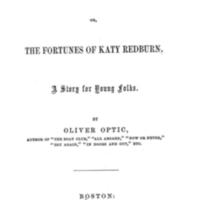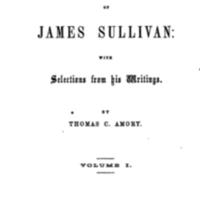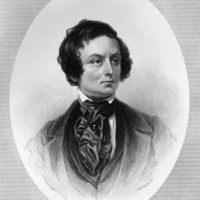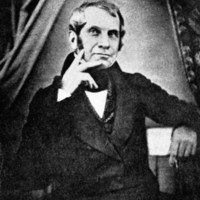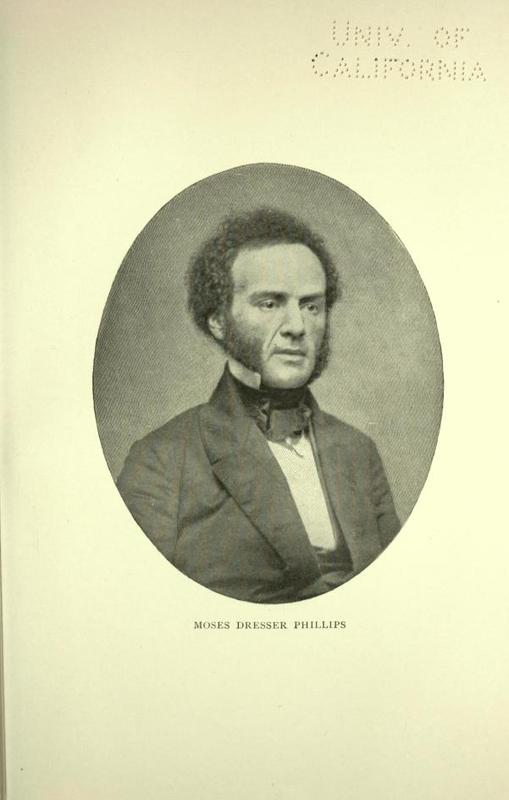Moses's Highest And Lowest Moments
By 1857, at this point the sole active senior member of the firm, due to Charles Sampson's illness, Moses decides to bring his business acumen, his money, and his firm’s reputation to a new periodical. He is one of the most successful publishers, his financial investments are paying off well, and the Phillips, Sampson and Company brand is recognized in the United States and abroad.
Phillips is aware of the financial problems in the book trade, which originated during the 1856 election, yet he still finds the idea of a magazine worth the risk. Despite the slowdown, he is successful selling books. Instead of taking huge risks, he wisely focuses on publishing books by his most well known authors. Moses publicizes their works through carefully established advertising markets and distribution networks.
Having observed the power of periodical voices in influencing public opinion, and having achieved marked success in publishing books in series, also likely contribute to his decision to begin a monthly magazine.
Moses invites several important literary figures to a dinner meeting at the Parker House in Boston in May of 1857. Phillips’s invitation to Henry Wadsworth Longfellow notes: “We shall sit-down to dinner at 3 o’clock, punctually, at Parker’s, room number 7.”
Phillips sits at the head of the table, while “Mr. Emerson took the first post of honor at my right, and Mr. Longfellow the second at my left.”
Moses uses the nonverbal language of seating arrangements, a language he knows his audience will understand, to emphasize his leadership role in the enterprise. During the dinner, he tells them:
“Mr. Prescott and Mr. Parkman know more of history
than I do,
Dr. Holmes and Mr. Lowell can write better poetry
than I can,
Mr. Emerson knows a hundred times as much as I do
of moral and other philosophy,
but you do not, any of you, know what the
American people wants to read as well as I do.”
Edward Everett Hale, "An American publisher," Lend a Hand 9 (1892) 254.
By mid-July, news of the P&S magazine is reaching the press.
The July 10 issue of the Pittsburgh Daily Gazette and Advertiser notes:
“A BOSTON MAGAZINE. – The Boston Courier says:
'It is stated that Phillips, Sampson & Co. Have made arrangements to commence the publication of an original American Magazine, in which, however, they propose to secure also the assistance of some English authors.'”
Within a week, the same paper cites another Boston periodical's announcement
of Phillips, Sampson & Co.'s new magazine:
"A new literary magazine is about to be started in Boston. The Journal of that city says:
'Such an effort, resolutely formed and strongly based, is now to be developed by the wealthy and enterprising publishing house of Phillips, Sampson & Co. of this city. They propose to start, early the coming fall, The Northern Magazine, monthly, at three dollars a year, to be altogether original, and to aim at the highest literary and political character.
The best of our American writers have been secured for its pages, and an agent of the publishers is now in England to secure aid in that quarter. Such men as Emerson, Longfellow, Lowell, Hawthorne, Huntington, Felton and Agassiz, are to be its master-spirits. It will, like the first-class British Reviews, discuss affairs of the State – the higher grade of politics - and seek to give food for strong men, not milk for babes, on all the greater themes of practical life, as well as to separate the false from the true, the low from the high, in our struggles after an American literature. The advent of this important enterprise will be awaited with interest, and its progress watched with eager and hopeful curiosity and favor.'"
As the Journal notes, still trying to decide on the magazine's title as late as July, Phillips is going with the working title of The Northern Monthly.
Although the Panic of 1857 is devastating the nation, Moses does not back down from launching his magazine. Wise from years in the literary marketplace, he understands that people will be willing to spend some precious money each month on a periodical that has articles by their favorite authors.
Phillips is the one with the financial pull and marketing ability for the new magazine, now called The Atlantic Monthly. His contributors are paid based on the publicity value of their names. While some contributors, such as Ralph Waldo Emerson are against naming the authors involved with the magazine, Moses uses the names for advertising. He understands that the familiar names of the authors and the Phillips, Sampson & Company brand will generate excitement. Since people as far away from Boston as Hawaii and Australia are reading reviews of Phillips, Sampson & Company books in their newspapers, a wide audience is familiar with the firm's brand. He utilizes all avenues at his disposal, including personal networks, newspaper advertisements, and broadsides, to advertise The Atlantic Monthly
The first issue of The Atlantic Monthly launches on November first, and, as Moses has expected,the press takes notice. One early review praises both the publishing firm and the new magazine:
“Much capital and talent are invested in the enterprise, and the publishers are among the most competent to introduce and conduct such a work. The present is the first number, and we must say that its articles are both intensely interesting and valuable. The mechanical erection of this monthly is certainly as good as any we have ever seen, and the list of contributors engaged, both American and Foreign, is as prominent, and promises as much of an intellectual feast, as any array of names we have seen for a long time..."
“The Atlantic Monthly,” Barnstable Patriot, December 1, 1857, p. 2
The Southern Literary Messenger, which has rescinded much of its earlier praise for the firm after Phillips, Sampson & Company has published antislavery works such as Stowe's Dred, does not have such positive things to say. However, as word about The Atlantic Monthly spreads through both printed items and word of mouth, The periodical quickly becomes very popular. Moses has made a wise investment, despite the financial panic which is wreaking havoc on so many of his readers and, therefore, the profits from his books.
Moses has made a wise investment, despite the financial panic which is wreaking havoc on so many of his readers and, therefore, the profits from his books. Phillips attempts to ward off any charges of the Atlantic Monthly's elitism by speaking to the people in newspapers and periodicals, including his rival's Harper’s Weekly, to inform all that Phillips, Sampson and Company have a wide audience in mind:
The Publishers take pleasure in acknowledging the kind reception every where accorded to their periodical by the people, and, generally, by the press. The first number was from the nature of the case, hardly a fair index of the character and resources of the Magazine. The present number exhibits a greater variety of matter, and is in every way more vigorous, as well as more attractive. The future will exhibit still farther improvements. To combine the greatest amount of healthful entertainment with solid information, and the most able discussion of topics of living interest, will be the constant aim of the conductors of the “ATLANTIC.”
The Publishers do not agree with the common estimate of the Public taste -- that it is necessary, at this day, to write down to the People; but they believe, on the other hand, that there are enough readers in this country to appreciate and pay for the best thoughts of the best writers of the times. Therefore, the ATLANTIC, though high in its aims, and though taking a position which can not be shared by any existing American magazine, is offered for sale at a popular price, and appeals to the good sense and the good taste of the great mass of the reading public.
Harper’s Weekly, December 5, 1857, 784:4
The Atlantic Monthly is high literature for the masses, presented at an affordable price. Without directly referring to its competitor, Phillips, Sampson and Company implies criticism of the pejorative tone of Harper periodicals in an advertisement within Harper’s Weekly.
The December issue of Atlantic Monthly includes an unsigned article, “The Battle of Lepanto,” which is the essay William H. Prescott had promised to Phillips in August.
Prescott also continues to be quite understanding about his publisher’s financial peril. In a Memorandum Concerning his Publishing Contract, Prescott writes:
December 11th, 1857. Told Mr. Phillips that if these times continued I should be perfectly willing to do whatever was reasonable in regard to the guaranty of $4,000 a year on the sales of the old books.
I said I thought the 3d volume of “Philip” would be ready by June; and at all events had very little doubt that it would be ready by October. But told him he must not understand this in a respect a promise on my part, as I could never consent to be a bookseller’s hack
Moses Dresser Phillips to William Hickling Prescott, December 30, 1857. Gardiner, ed. The Papers of William Hickling Prescott. Footnote from Gardiner: Initially WHP’s contract had called for $6000 annually from these titles. He had already made a considerable concession to his publishers.
Later in the month, a grateful publisher responds to his author:
Tuesday, December 30, 1857
My Dear Sir,
Mr. Kirk handed me your very kind note of yesterday, but I was too much occupied to reply. Pray be assured the delay was not because I did not at once feel this renewed act of great kindness and generosity.
It is true that my settlement of the late account was based wholly upon your figures as you say, and not that I have even now looked into the contract. It is entirely sufficient for me that you interpret or state it to be so.
But now what shall I say to thank you for your generous surrender of so much that belongs to you?
I will tell you what I will say. I will promise to try to make it good to you in my future efforts for the sale of your works.
I reminded you the other day of your voluntary alteration of the original contract and told you how many times I had told of it -- as illustrating your desire for exact justice, -- and with your leave I shall, as I may have occasion, relate these fresher circumstances also, as showing how careful you are that no interest of yours shall ever bear unpleasantly (though it be a contract) upon your publishers.
I said before and I now repeat that such has never in any single instance been my experience before.
And now in return for all of this I can promise but one poor return and that is that as in times past, so shall your interests in the future have my first -- highest and paramount consideration and exertions -- and if there is any world and money left, we will make a good return.
Tendering you the compliments of the Season, I am Very truly yours
Moses Dresser Phillips to William Hickling Prescott, December 30, 1857. Gardiner, ed. The Papers of William Hickling Prescott, 384-385
The industrious Phillips is faced with a setback over which he has no control. Although his conservative book publishing strategies during 1857 may have been motivated, in part, by a sense that the market was experiencing some difficulties, the extent of the crisis could not have been anticipated. Phillips is hoping for an economic upswing, during which he can work to “make a good return” on the Prescott books, but relief does not come quickly.
Moses Dresser Phillips to William Hickling Prescott, June 12, 1858 Gardiner, ed. The Papers of William Hickling Prescott: 391-392.
Meanwhile, Hawaii’s Polynesian reviewes James Jackson Jarves’s 1857 publication, Why and What am I? in its March 20th issue. Readers far from Boston are becoming aware of the work of Jarves, who had founded Polynesian several years earlier. Those who decide to purchase the book also have the opportunity to learn about Phillips, Sampson and Company, since the firm includes a short catalog in the back of the book. After leading the catalog with several books by William H. Prescott, the publishers include an excerpt from a June 8, 1855 letter from Prescott that praises Rev. John Stetson Barry’s History of Massachusetts to inspire fans of Prescott to purchase Barry’s book.
While the review of Jarves’s book comes to readers in Hawaii several months after its publication, and it is not a positive review, it is possible that Phillips, Sampson and Company receives orders for Why and Who am I, and later other books, due to attention in this new market.
Apparently, Phillips, Sampson & Company is still unfirm, but recovering. Life Thoughts: gathered from the extemporaneous discourses of Henry Ward Beecher, edited by Edna Dean Proctor, is one new offering with excellent prospects for success. Beecher is a well-known preacher at Plymouth Church in Brooklyn, New York and a popular contributor to The Independent, a New York periodical. Beecher's sister, Harriet Beecher Stowe, has a new novel, Our Charley, and what to do with him, in the 18mo format at the inexpensive price of fifty cents. By issuing books by popular authors in various formats and prices, the Boston firm attempts to woo the public.
Reprints of William Hickling Prescott’s Biographical and Critical Miscellanies and Conquest of Mexico are also on the market. Despite the difficult financial climate of 1858, Moses Dresser attempts to fulfill at least part of his firm’s debt to his famous author by writing a check to his popular author. In his June twelfth note, Moses thanks the historian for his patience:
"For these repeated concessions and accommodations on your part, I have no parallel in my business relations, -- and the only poor promise I have in return for them is that if I live, it shall be my endeavor to show that your munificence has not been thrown away.
What I shall want afterwards I am sure I don’t know -- but I do want to live to show the world what can be done with that great Post Octavo scheme. Leaving “Uncle Tom’s Cabin” out of the way, and then I shall beat the world in a three or five years stretch, -- i.e. in the number of volumes sold from one pen.
What my ambition will be afterwards I don’t know -- but that I have and that I shall do.
May you and I and the Atlantic Monthly all live to tell the world of it when it is done. Very truly yours
M.D. Phillips"
Moses Dresser Phillips to William Hickling Prescott, June 12, 1858 Gardiner, ed. The Papers of William Hickling Prescott: 391-392.
Although in financial distress and apparently harboring concerns about his own health, since he is suffering with consumption, Moses Dresser Phillips remains optimistic that his firm will recover its financial success. The prospect of launching the “great Post Octavo scheme” of issuing the historian’s books in duodecimo (12mo) format, the goal of surpassing the sales of the book he has been mistaken not to publish, and the notion of establishing a potent periodical voice serve to motivate the ambitious publisher’s will to live.
Utilizing the new journal to accomplish tried and true strategies, Phillips, Sampson and Company publish The Autocrat of the Breakfast Table, Every Man his own Boswell, the controversial work of Oliver Wendell Holmes which has appeared in series form in the Atlantic during 1857 and 1858, in book form in time for the holiday season. As he has so many times before, Phillips utilizes the series format, then sells the intellectual property he already holds rights to in more permanent form.
As we learn from Prescott’s appreciative acknowledgment of the new volume on his desk, he and Holmes, two important firm authors, were in contact regarding this and other works the firm brought out in the recovering economic climate of 1858:
Beacon Street, December 28, ‘58.
My dear Dr. Holmes,
I am truly obliged to you for the beautiful present you have sent me of the Autocrat. The volume is got up in a style of the most perfect elegance and taste. The dress is just what it should be for a work in which a sound philosophy and acute criticism are conveyed under the playful and popular garb of a literary lounger.
Phillips has officiated as your midwife as well as mine in bringing our literary bantlings into the world; and as he has just delivered my muse of another of her numerous progeny, I hope you will allow me to send it to you as a memento of our simultaneous appearance before the public.
With great regard believe me, my dear Dr. Holmes, Very sincerely yours Wm. H. Prescott
William Hickling Prescott to Oliver Wendell Holmes, December 28, 1858 The Papers of William Hickling Prescott, ed. C.Harvey Gardiner (Urbana: The University of Illinois Press, 1964), 395-396.
Prescott’s discussion of his book’s “dress” indicates the important connection between external appearance and internal character for the author and many members of the Phillips, Sampson and Company audience. Apparently, as late as 1858, many men, as well as women, agree with house author Lydia Sigourney that “the fine exterior of a book has the same bearing on its contents that graceful manners have upon character.”
Lydia H. Sigourney, Letters of Life (New York: D. Appleton, 1866), 337.
Although some of the firm’s reputation and financial success is due to its attempts to promote quality products without bindings (which are bound in owner-designed covers at the top end of the market), the publishers also have to be careful to attend to the needs of all potential consumers, including that ever-enlarging segment that buys their books as bound by the publisher.
Some of the books Moses and his firm present to younger readers in 1859 are juvenile books by Willam T. Adams ("Oliver Optic") and The Standard Third Reader by Epes Sargent. Phillips also publishes a biography of a popular Massachusetts governor, Life of James Sullivan, which is written by his grandson and Prescott's brother-in-law, Thomas C. Amory.
In addition to battling consumption himself, Moses loses William Hickling Prescott in January and Charles Sampson in March. His firm continues to publish books relating to health issues, such as Dr. Jacob Bigelow's Nature in Disease.
After waging a brave battle against consumption and signing his last will and testament, Moses Dresser Phillips passes away at his Brookline Village home on August twentieth. Once the word of his passing reaches the Boston book trade, Little, Brown and Company host a Monday afternoon public meeting in honor of Phillips. Book trade members attending the meeting pass the following unanimous resolutions:
Whereas, we have learned with regret, of the death of our friend and co-laborer, Mr. Moses D. Phillips; therefore
Resolved, That we have always recognized in him the character of an honest, faithful man; that we cherish his memory with respect, and that in his death we have lost an intelligent and useful member of the trade.
Resolved, That we close our places of business during the funeral services.
Three colleagues also offer tributes:
One says of him: ‘He became favorably known for his intelligence, excellent judgment, and executive abilities. In comparatively a short time the firm gained a high reputation at home and abroad. The deceased was much respected by the whole community, and was highly esteemed by a large circle of friends.’
Another remarks: ‘He was a man remarkable for his modesty, industry, honesty and nobleness of heart; was amiable, faithful and reliable. Those who knew him well, agree that he had a genial spirit, a fund of ready anecdote, and great kindness of heart.’
A third writes: ‘After almost daily business transactions with Mr. Phillips and his firm, for about fifteen years, it is but truth and justice to say, that he always thoroughly understood what he wanted, gave his orders concisely, managed everything methodically, was always ready to assist in removing difficulties and smoothing the path, and never put obstacles in the way; was always courteous and agreeable, even when most pressed by his multitudinous engagements. And during the whole period, no matter under howsoever trying circumstances (and no doubt they were often presented), he never lost his good temper or spoke to us an unkind word. Amidst a multiplicity of calls in attending to so large a business, he was always attentive and social to the caller, and had a ready fund of anecdote, or story, or humor, to make pleasant the dreary path of daily toil and care. He was to be envied while living, and his memory will be fondly cherished, we doubt not, by hundreds, if not thousands, of persons who had no kinsman’s claim, but who enjoyed the broad comprehensive and practical view he took of the subjects discussed with those whose daily walk brought them into his society. As a business man he was a model.’
Albert M. Phillips, comp., Phillips Genealogies (Auburn, Mass.: 1885), 91-92.
Although his exemplary character and important influence as a model have been given small notice in scholarly studies, the publisher’s contemporaries certainly appreciated and admired Moses Dresser Phillips as both man and publisher.
